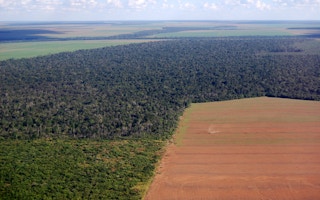When we think of deforestation, we mostly think of chainsaws cutting timber and trucks carrying it out of rainforests – or of desperate peasant farmers chopping and burning trees to clear land so they can grow crops to feed their families.
But these images are only a small part of the story.
At the start of the 21st century, it has become clear that the biggest cause of tropical deforestation is demand for agricultural commodities such as soy, beef, palm oil, sugar and cocoa. It is not people far away who are destroying the forests; it is us.
Over the past two decades, the European Union (EU) has been the world’s largest driver of tropical deforestation.
In 2013 an EU study found that between 1990 and 2008, 53 per cent of global deforestation was due to agricultural expansion, a third of which was to grow crops for international trade. The EU as a whole was the largest single destination for these crops and livestock products. This deforestation is not just environmentally damaging - it is also often illegal.
The illegality takes different forms, from forests destroyed using forged or bogus permits, to companies and farmers pushing out local villagers, and a range of other environmental and human rights offences.
New research by the social and environmental NGO Fern found that in 2012 the EU imported roughly a quarter of all the internationally traded soy, beef, leather and palm oil that had been grown on illegally cleared tropical forest land.
This European trade had a value of 6 billion euros, the equivalent of illegally felling a forest the size of a football field every two minutes.
The impact of Europe’s hunger for agricultural commodities can be seen across tropical landscapes. The island of Sumatra, for instance, which is almost twice the size of Britain, was until recently home to one of the world’s largest intact rainforests. But in the past two decades, major agriculture and timber companies have moved in, expelled local people, stripped the timber and replaced the jungle with oil-palm monocultures.
Most Europeans are oblivious to this. So what should we do?
Supply chain scrutiny
“
The EU as a whole was the largest single destination for these crops and livestock products. This deforestation is not just environmentally damaging - it is also often illegal.
Ensuring the legality and sustainability of the EU’s agricultural commodities supply chain will undeniably be complex, but there are clear steps that can be taken.
First, large companies should open their supply chains to full scrutiny and commission independent public audits of their performances on land rights and deforestation.
Some have already begun this. Nestlé, the world’s largest food company, has started a global assessment of the land tenure of its commodity suppliers, audited by consultants ProForest and TFT. An early finding was that only 58 percent of its chocolate producers in Côte d’Ivoire had secure land rights, which it has flagged up as a threat to its supplies as well as to the farmers.
Second, since only governments can really address issues of illegality and land rights, promoting the good must be accompanied by penalising the bad - both to ensure that ‘good’ products are not undercut in the marketplace and to curb demand when it exceeds sustainable supply.
New rules are needed, specifically a broad EU Action Plan on Deforestation. This should extend the rules outlined in the EU’s flagship forest policy, the Forest Law Enforcement, Governance and Trade (FLEGT) action plan, to cover agricultural commodities, starting with key ones such as palm oil, soy and beef.
This would not ensure zero deforestation on its own, but it would ensure legality, which is often the major barrier to achieving zero deforestation. Under such rules, only commodities grown on land legally approved for them – and legally converted from forests – would be eligible for import to the EU.
More information
Third, the power of Europe’s ethical consumer lobby is being undermined by a lack of information. To take two examples, most processed products do not have to show the origin of their ingredients, and the meat you buy does not have to indicate where the feed given to the animal came from. This should change.
As the highest per-capita consumers of fair-trade and organic produce in the world, European consumers’ ethical and environmental concerns are well established, but they need more detailed information about the environmental impact of the food they buy.
Delivering it requires the development of easy-to-understand benchmark standards for information that food producers are required to put on the label. One model would be the ‘traffic lights’ system used to alert consumers to products high in sugar, fat or salt.
Tropical deforestation threatens the global climate, local ecosystems and the livelihoods of many of the world’s poorest. And tackling these issues is close to the hearts of many European consumers, who do not want their everyday habits and purchases tainted by human rights abuses and environmental destruction.
They have a right to be protected from complicity in these crimes. They should be able to be confident that their purchases are not a result of illegal activity.
Failure to act will be a betrayal of Europe’s consumers. And by fostering ecological unsustainability and encouraging festering disputes over land and human rights abuses, it will also ultimately threaten Europe’s own food supplies.
Fred Pearce is a board member of Fern and author of Protecting Forests, Respecting Rights, a new report outlining options for EU action on tropical deforestation. This post is republished from Thomson Reuters Foundation Alertnet.











